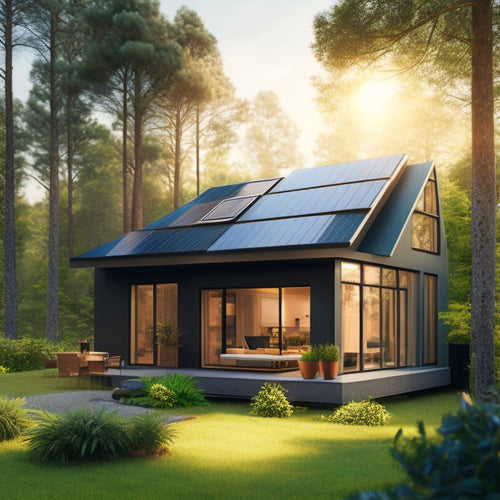
3 Essential Steps for a Solar System Setup at Home
Share
You're about to shift to a cleaner, more sustainable energy source by setting up a solar system at home, and the key to a successful installation lies in three critical steps: evaluating your energy needs, choosing the right equipment, and guaranteeing proper installation and maintenance. You'll need to calculate your daily energy consumption, considering appliance wattage, lighting, and HVAC, to determine the right system size for your home. Next, you'll select high-efficiency solar panels, inverters, and batteries based on your energy needs and budget. By following these essential steps, you'll be well on your way to utilizing the power of the sun - and there's more to investigate to guarantee a seamless shift.
Key Takeaways
- Assess daily energy consumption by reviewing past utility bills and calculating total energy usage to determine the required system size.
- Choose high-efficiency solar panels, suitable inverters, and battery storage capacity based on power generation needs and system layout.
- Ensure proper installation by a certified team, followed by regular system inspections, cleaning, and annual maintenance checks for optimal performance.
Assessing Your Energy Needs
Your daily routine - from charging your smartphone to powering your refrigerator - relies heavily on energy. Understanding your energy consumption is essential when considering a solar system setup at home.
You need to determine how much energy you use daily to size your solar panel system correctly. Start by reviewing your past utility bills to get an idea of your average energy consumption. Consider the wattage of your appliances, lighting, and HVAC systems to calculate your total energy usage.
Budget considerations also play a significant role in determining the size of your solar system. You'll need to balance your energy needs with the cost of the system. A smaller system may be more affordable, but it may not meet your energy demands. Conversely, a larger system may provide excess energy, but it may be cost-prohibitive.
Choosing the Right Equipment
With a clear understanding of your energy needs, you can now focus on selecting the right equipment for your solar system setup. The first step is to choose high-efficiency solar panels that can generate the required power. Consider factors like panel size, durability, and warranty when making your selection.
Next, you'll need to decide on an inverter type. String inverters, microinverters, and power optimizers each have their advantages and disadvantages. Consider your system's size, panel layout, and shading factors when making your decision.
Battery storage is another critical component, especially if you want to store excess energy for later use. Choose a battery with a sufficient capacity and depth of discharge to meet your needs.
Mounting options are also important, as they affect system efficiency and durability. You can choose from roof-mounted, ground-mounted, or tracking systems, depending on your roof type, available space, and budget.
When selecting equipment, consider the overall system efficiency, grid connection requirements, and cost comparison.
Don't forget to evaluate warranty considerations, as they can impact your system's long-term performance and maintenance costs.
Installation and Maintenance
Proper installation is essential to guaranteeing your solar system operates efficiently and effectively.
You'll want to verify that your installation team is experienced and knowledgeable about the permitting process and safety regulations in your area. A well-installed system won't only generate more power but also last longer and require less maintenance.
Here are some key considerations for installation and maintenance:
- Confirm your installation team is certified and experienced in solar panel installation.
- Inspect your system regularly to identify and address any potential issues before they become major problems.
- Keep your solar panels clean to maximize energy production - dirty panels can reduce energy output by up to 25%.
- Schedule annual maintenance checks with your installation team to verify your system is running at peak performance.
Frequently Asked Questions
Can I Install Solar Panels on a Rented Property?
You'll need to obtain your landlord's permission before installing solar panels on a rented property, and consider drafting solar panel agreements that outline roles and responsibilities for maintenance, repair, and eventual removal.
How Do I Store Excess Energy Generated by My System?
You'll need a battery storage system to store excess energy generated by your solar panels, ensuring a reliable backup power supply; energy management systems will help you monitor and optimize energy usage, maximizing your system's efficiency.
Are Solar Panels Affected by Weather Conditions Like Hail?
Can you imagine investing in solar panels only to have them destroyed by hail? Fortunately, most solar panels are designed to withstand hail damage and extreme weather conditions, thanks to their weather resilience features, ensuring you still utilize maximum power.
Can I Use Solar Energy to Power My Electric Vehicle?
You can definitely use solar energy to power your electric vehicle, leveraging solar charging to tap into renewable benefits; simply install a solar panel system, charge your car, and enjoy a sustainable, zero-emission driving experience.
Do Solar Panels Increase My Property's Value?
You'll be pleased to know that installing solar panels can enhance your property's value, as a property appraisal will likely reflect the increased energy efficiency, making your home more attractive to potential buyers and increasing its resale value.
Related Posts
-

Why Go Green With Automotive Products Online?
By switching to eco-friendly automotive products online, you're taking a significant step towards reducing your carbo...
-

7 Ways to Save on Residential Home Solar Panels
You can save thousands on your residential home solar panels by leveraging financial incentives, dealer offers, and s...
-

Reduce Solar Panel Cost for Your Small Home
By evaluating your energy needs, choosing the right installer, and selecting cost-effective solar panel options, you ...


